The secrets of sushi service
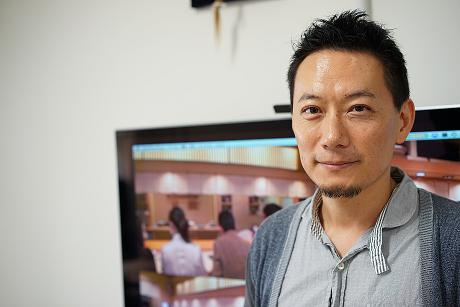
An interview with
Yutaka Yamauchi
Senior Lecturer
Graduate School of Management
New directions for management studies
The scene: a traditional sushi bar in downtown Tokyo. A subtle, verbal duel is being played out between chef and customer. The customer is asked what he would like to drink, and simply by responding, reveals the depth of his knowledge of sushi. It is a world far removed from laboratories and computers, and yet it is precisely this setting that enables Yutaka Yamauchi of the Graduate School of Management to conduct his research.
For Yamauchi, analyzing such conversations — not only at high-end, authentic sushi bars but also fast-food restaurants — enables him to decipher the complex dynamics underlying service provider–consumer relationships. His unconventional approach signals new and exciting directions for management studies.
First of all, what led up to your research on how sushi chefs interact with their customers, and vice versa?
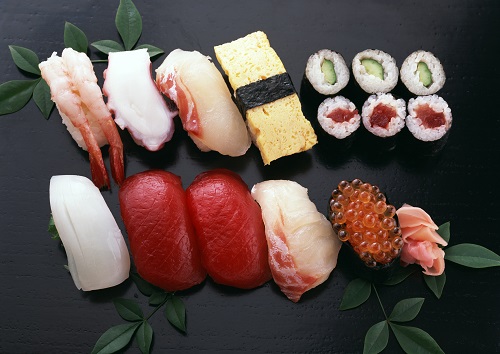
Sushi has become a global phenomenon
Yamauchi: There are many reasons. I think the biggest reason is when I came back four years ago from the US, I was thinking about what to study. Studying Japanese companies used to be a good idea in the 80s and 90s, but now, not any more. When I started thinking about what would be the best or what would be the most competitive area in Japan right now globally, sushi was the obvious case. Everybody likes sushi; it's spread all around the world.
The second reason is because I'm in Kyoto, I wanted to study something here. The obvious choice would be ryoriya, a traditional type of Japanese restaurant or ryotei. However, it's not easy to study that kind of place because unlike sushi bars, the customers are given their own room and they dine there. Occasionally, somebody comes with the food and there's not much interaction.
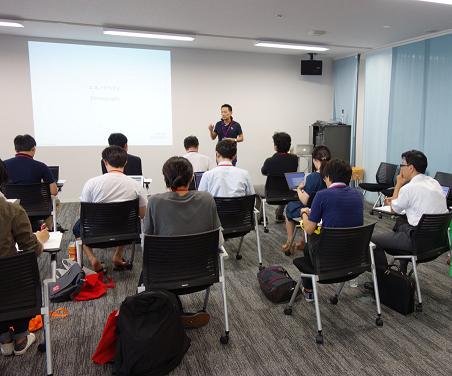
Dr Yamauchi with students at Kyoto University's Graduate School of Management
Indeed. Your work seems to overlap between the fields of behavioral studies, informatics, and even linguistics. Could you please explain how your studies might be applied to the broader field of management studies?
Yamauchi: Yes, that's actually the third reason for me to do this. At the Graduate School of Management, Kyoto University, we have a service evaluation program, side by side with management, accounting, finance, and project management. Service is seen as a discipline. The reason is that service is a very important part of the economy. 80% of the economy is service. Even the manufacturing companies are trying to shift to service. This whole area called service science was started by IBM. In the past, IBM used to make money by selling computers, but now they don’t manufacture many computers. They sell services to build systems and do consulting.
So, IBM had this notion — in the same way that you have science of agriculture, science of aquaculture, or manufacturing — they started service science. That's obviously important for Japan. The government had some funding for research on educational service. Before I joined, this School received funding from the Japanese Ministry of Education, Culture, Sports, Science, and Technology (MEXT) and started this program. Service is a very important area in management; that's why we’re doing this.
When I started doing this study on sushi, people didn't immediately recognize it as something relevant to management. It's been difficult to write papers; I cannot really talk about the whole aspects of service when I write papers for management. I have to pick certain aspects. For example, I talk about routine, because routine is a big concept in organization theory.
In your paper, 'Negotiation of Selves in Initial Service Encounters: Conversation Analysis of Sushi'[1], you mention the parallel between a sushi chef and customer with a professor and student. You suggest that the situation might be transposable. Do you think this might be useful in other sectors and industries?
Yamauchi: Yes, service in general. Education is also a service, and healthcare, too. Many people are against the idea that education is a service. It's not about getting money or that kind of service, but if we take a broad view that those are services, the work is relevant to any sector. Another perspective is whenever you do business, you have an interface with the customers. That's a service. If you sell an automobile, the customer buys it, but when they drive it, you have some interface with the customer. There are many opportunities to provide value in that context. Many companies are doing that — not just selling the car, but supporting the customer throughout the whole process. Service is important for the public sector too, particularly in Europe.
But let me answer your question. Whenever you have service, the relationship between the provider and the customer is very important. Although we study sushi, where sometimes chefs have some "power" over customers, that's actually not necessarily an exceptional case, theoretically at least, because there's always a power struggle whenever providers and customers meet. Similarly, there can be a power struggle between teacher and student, doctor and patient, and also consultants and clients.
In that case, what makes sushi service particularly unique to study?
Yamauchi: The reason I chose sushi was that it's unique in that the whole power struggle — the presentation and negotiation of selves — is salient. They do these kinds of things explicitly. They don't provide any written menu. They don't smile. So, when we think about going to traditional style sushi bars, we feel anxious. Going to a sushi bar is an anxious experience. That aspect is salient in this domain.
A French restaurant is the same way. When you go to a grande maison, you have to wear a tie and feel you have to fit into that atmosphere. Unlike sushi bars, they provide a written menu, but the customer is not expected to be able to understand the menu, the carte. They make it intentionally not understandable to customers. That's part of the struggle. And it's not just for the high-end services. If you go to Starbucks, you can read the menu but in many cases, you don't know the details.
Do you mean that in many cases, you don't know what's inside in terms of the ingredients if they have fancy names?
Yamauchi: Fancy names. Exactly. If you search for "Starbucks" and "how to order" on the web, you get all kinds of information. Seriously! People talk about how to order at Starbucks.
There's a type of ritual, isn't there? Something like "flat white, hold the mocha…".
Yamauchi: Yes. It's not easy. When they design that kind of service, they know it's a struggle.
Talking about fast food, we should also mention conveyor belt sushi, which is becoming more and more popular overseas as well, it seems. Were they originally designed to take the interaction between the sushi chef and the customer out of the equation?
Yamauchi: Conveyor belt sushi was invented in Osaka and the idea was to streamline the whole process in order to reduce the cost. They probably had the understanding that the whole mechanism of interaction or dominance is probably not good for many customers. That's an interesting aspect. Many customers like it and pay for it, but many customers don't like it. That's actually not contradictory, it's just dialectical. But I need another hour to talk about it!
(Laughter)
Yamauchi: Let's put it aside. My observation is that whenever the Japanese talk about conveyor belt sushi, they always talk about real sushi. When they say, "I went to eat sushi yesterday," they need to add, "The rotating one, though." We cannot just focus on conveyor belt sushi and treat is as a single phenomenon. It is always a reflection of traditional sushi.
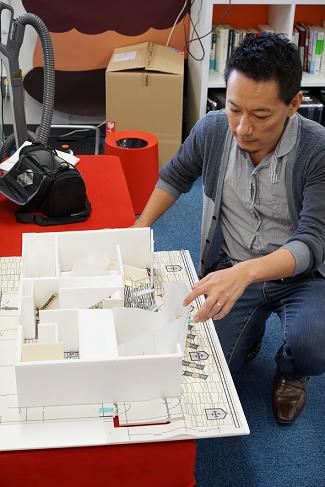
With design plans at Kyoto University's Graduate School of Management
Now, I understand that your subject area can be classified as ethnomethodology. Is that the study of rituals?
Yamauchi: Good question. Ethnomethodology, by definition, is the study of methods. "Ethno" means people's methods. So ethnomethodology is about understanding what kind of methods people use to accomplish their work or things in their lives. I guess the easiest example is: how do you conclude a conversation? You're talking with somebody, let's say you're talking with your friend in the corridor and you want to conclude the conversation. How do you do it? Many people say, "You say goodbye." But you cannot say "Goodbye" in the middle of a conversation.
Is there a natural response?
Yamauchi: Right, there is a method for ending the conversation. The way we do it is basically when one certain topic comes to an end, for example, with somebody talking about what happened over the weekend, then the story is revealed and it comes to an end, the other person gets their turn. The other person says, "Well…" and the first says, "Well…", and then they can say goodbye. This is called pre-closing. By saying "Well" when you get the opportunity to insert a new topic, you convey that you have no intention to do so and are ready to conclude the conversation. We do it all the time, pre-closing and then closing. We have a method for doing it but we don't talk about these methods everyday. We conclude the conversation but it remains a mystery. Ethnomethodology is about understanding these methods.
How do you actually go about analyzing these interactions?
Yamauchi: My research usually involves videotaping and analyzing conversations line by line. I couldn't really study conversations at ryoriya in Kyoto because I couldn't observe much interaction there, but I could observe these types of interactions at sushi bars.
Would your research also have an impact on linguistics and even sociology?
Yamauchi: Broadly speaking, ethnomethodologists are sociologists. I'm not a sociologist by training. I'm a management scholar — an organization theorist within management. Whenever I do ethnomethodology, I study interactions from a management research perspective. So in the sushi case, I study how the service is organized and how its value is realized.
You mentioned videotaping to analyze these types of conversations. We cannot ignore the fact that there have recently been some news stories about researchers not obtaining appropriate filming permissions. Would you be able to comment on the ethics of the research?
Yamauchi: First of all, that kind of event is unfortunate for us because that will make it a little bit more difficult for us to do this kind of study. We know that we are doing something very sensitive, so we are very careful. At our school, we have an internal review board. We follow the procedures and obtain consent.
I guess a related question is about when we film people, they may change their behavior. Firstly, we cannot study people without getting their consent, so in that sense, it's inevitable. Using video cameras, people tend to forget really quickly, after 30 seconds. They cannot really keep thinking about it. That's our experience. But the real answer is that people's actions are always public. We are interested in analyzing how they make their actions public. Of course, by putting a video camera [there], they may change their behavior a lot. Depending on your research question, you may not be able to use the data. However, any changes in behavior due to being watched are not necessarily an obstacle, because we are interested in that aspect.
People know that they're performing in a certain way by going to a sushi bar in the first place?
Yamauchi: Always. They are very conscious of it. Even very simple actions that we do can be a performance, like the response cry — when we trip up in front of people, we say, "Oops." That's actually a performance. We're not saying it as an automatic reaction. We're basically showing that we are surprised, that we are actually better than this. This is a surprising and therefore unusual event. That's performance.
Going back to sushi, I analyze interactions and the negotiation of selves. That's interesting, but it begs many questions. First of all, why are customers doing this? Why are they paying for being anxious? After doing this kind of empirical study, I naturally became more curious about the cultural or historical aspect of service. Now, I'm writing up a book on the whole thing this year. A big part of the book is about the cultural and historical aspect of service.
I look forward to hearing and reading more. Talking about your day-to-day work here at the University, what are some of the unique aspects of Kyoto University that make your research possible?
Yamauchi: I think the university offers a great, liberal environment to face this kind of challenge. I don't know if it's unique to this school, but because we are situated in this geographic region, very far from the economic center, we have the cultural and academic tradition of being independent. Many people are supportive of doing something challenging, even if it's difficult.
One of the biggest challenges for the Japanese economy particularly in the service sector is that it's very difficult to export service. That's because they try to export Japanese service without knowing its core strength. There's no theory about it. So they have to do it based on a hunch. However, if, through this kind of research, we can show the structure or some kind of mechanisms of principles of these services, we can provide some means for them to think about it and position themselves differently.
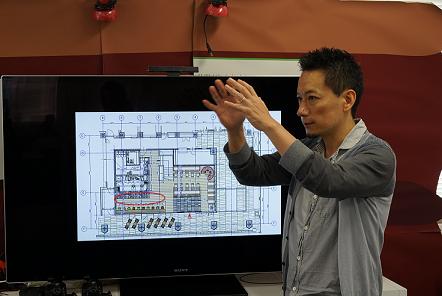
Dr Yamauchi describing a collaborative project at Kyoto University's Design School
I understand that your work also relates to "Kyoto University Design School". Could you tell us more about it?
Yamauchi: Design School is a new doctoral program. It started two years ago as a collaboration between the Kyoto University Graduate Schools of Informatics, Engineering, Education, Management, and Kyoto City University of Arts, so it's an interdisciplinary doctoral program. At Design School, we have an emphasis on service design, a very important topic in Europe particularly, and it's starting to take off in Japan. I think we can contribute unique insights into service design based on this sushi research.
In addition to sushi, you also study service design at fast food restaurants?
Yamauchi: Yes, the reason why I'm working with MOS Burger is that we are doing a project on fast food service design. Students are actually designing fast food service. Our current workshop started in October 2014 and during the Fall Semester, we will roll out a design at MOS Cafe on Karasuma.
Finally, looking at the big picture, do you see your role as treading a new path for management studies?
Yamauchi: I am certainly doing something strange from the standard management research perspective. I could have worked on mainstream questions but I realized that it was important to revisit the whole assumptions that we have about services. Typically we assume that services are about fulfilling customers' requirements and satisfying them. But why do people pay a lot to feel anxious and experience such an opaque service? I realized that I needed to have a new perspective to understand such phenomena. It is challenging because no existing theory is available for us to pick up. We need to develop new theories.
Thank you very much for your time.
Published: 28 November 2014
References
- Yamauchi, Y and Hiramoto, T. Negotiation of Selves in Initial Service Encounters: Conversation Analysis of Sushi. Serviceology for Services 347–353 (2014).
Profile
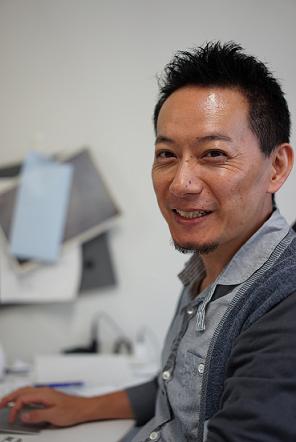
Dr Yutaka Yamauchi is a Senior Lecturer at Kyoto University's Graduate School of Management. He specializes in organization theory, ethnography, and ethnomethodology. His current work focuses on service encounter, service design, and social design. After graduating from the Kyoto University Faculty of Engineering, he received a Master's Degree from the Kyoto University Graduate School of Informatics, and obtained his PhD from the UCLA Anderson School of Management. He was a researcher at the Xerox Corporation Palo Alto Research Center prior to his current position at Kyoto University.
Additional information
For more information about Dr Yamauchi's research, click here
To find out more about Kyoto University's Design School, click here
Kyoto University Research Administration Office (KURA)

